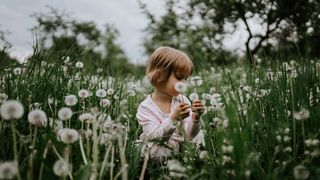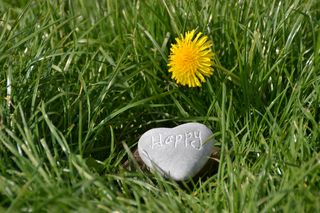Attention
Balancing Personal Joy and Difficult News
Tools for staying happily sane, while facing reality.
Posted September 2, 2019

Wired this way
I was asked to be on a panel next week for Climate One, at the Commonwealth Club in San Francisco.
The title alone makes me feel overwhelmed: Heavy Weather: Balancing Joy and Despair. What can I possibly say about this topic that is helpful, when I struggle mightily with this very question?
My struggle isn’t new. I remember as a child, sitting on the school lawn at Jefferson Elementary in Pullman, Washington, picking dandelions with such delight. But even then, I was the type of child who would run from the television in fear of a war with China, when Walter Cronkite reported that a U.S. ship had gone into the wrong waters.
I can’t remember a time when I did not worry about the consequences of hate on the well-being of people, including myself. The idea that anyone would willfully exploit or hurt another for personal gain seemed shortsighted to me. I was sure we were living in humanity’s adolescent stage, which I expected we would grow out of in my lifetime.
I would never have guessed that I’d live in a time when the daily news continues to report how we humans readily hurt each other over and over again, often for profit and personal gain. The truth is, that while my educated mind can cite the research explaining why this is so, my heart continues to be perplexed by it. At times, I feel despair.
Perhaps because this is the way I am wired, I have come to recognize some key tools that help keep a balance between my joy and despair.
First, I try to engage in daily practices that relax my nervous system and make me feel safe and loved.
When our nervous systems think we are threatened, we are less able to be our best selves. Remembering our wellness is important to being a joyful and kind contributor to the world.
Research on meditation (Vieten et al., 2018), mindfulness (Janssen et al., 2018) and exercise (Roque et al., 2013) indicate that these practices are good for relaxing the nervous system, increasing well-being, and maintaining agency in the world. I find them essential.
Second, I seek out opportunities to feel interconnected with other people and the natural world.
Social support and connection that bring out our best selves are critical to us being able to access joy and not get locked in despair. Just think of what it is like to be with people who focus entirely on the negative aspects of the state of the world. Contrast that with being with people who can look to the sky and enjoy the starry night with pure joy.
This isn’t about being a Pollyanna, but about making sure we have balance in the type of people with whom we share our time and energy.

Third, I seek out opportunities to be of service to something greater than my own well-being.
This last piece is a challenge because in order to be of service, I have to know where service is needed and that can lead me down the rabbit hole of the daily news. For this, I follow some excellent advice in Sacred Instructions by Sherri Mitchell (2018), the 80-10-10 Rule:
“...invest 10 percent of our energy looking at what needs to be changed, another 10 percent holding back the tide of harm that had been created by our previous investments [in thing that cause harm], and the final 80 percent creating a reality that offers compassion, safety, equality, justice, and sustainability for all life” (p. 139).
Last, I attend to the joys, generosity, and kindness that is all around and amplify it!
In the end, we have a choice in what we are going to pay attention and give our energy to. When I pay attention, I find truth in Carrie Newcomer’s songful words, “I believe that most people are doing the best they can.”
In the end, I wake each morning hoping that this is true for myself. And when I go to sleep at night, I forgive my failures and try again the next morning. There is joy in this practice that balances out the despair.

Parting thoughts
Just thinking about having a day that has all these things brings me relief. Why? Because I can only spend so much time worrying before my nervous systems simply won’t stand for it.
And we, my friends who care about other people and the earth, are living in complete overwhelm way too much of the time. This isn’t healthy for our bodies, minds, or souls, and it makes us less able to help our families, communities, and the world.
We have an opportunity to bring balance to our lives—being cognizant of the reasons for despair, but acting with joy and gratitude for the gifts of this day. This is more honest than repressing the despair, healthier than living in helplessness, and simply a happier way to navigate these crazy times.
References
Janssen, M., Heerkens, Y., Kuijer, W., van der Heijden, B., & Engels, J. (2018). Effects of Mindfulness-Based Stress Reduction on employees' mental health: A systematic review. PloS one, 13(1), e0191332. doi:10.1371/journal.pone.0191332
Mitchell, Sherri (2018). Sacred Instruction. Berkeley, CA: North Atlantic Books.
Roque, F. R., Briones, A. M., García-Redondo, A. B., Galán, M., Martínez-Revelles, S., Avendaño, M. S., … Salaices, M. (2013). Aerobic exercise reduces oxidative stress and improves vascular changes of small mesenteric and coronary arteries in hypertension. British journal of pharmacology, 168(3), 686–703. doi:10.1111/j.1476-5381.2012.02224.x
Vieten, C., Wahbeh, H., Cahn, B. R., MacLean, K., Estrada, M., Mills, P., … Delorme, A. (2018). Future directions in meditation research: Recommendations for expanding the field of contemplative science. PloS one, 13(11), e0205740. doi:10.1371/journal.pone.0205740




